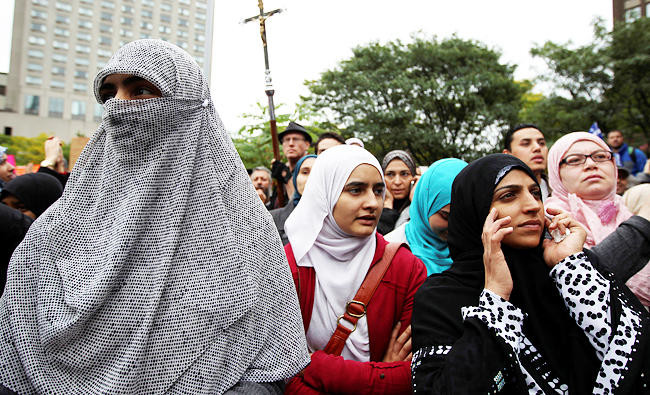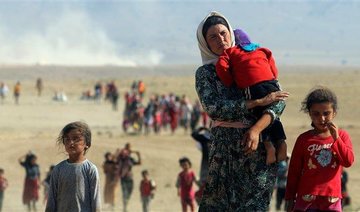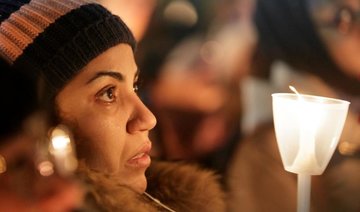MONTREAL: Quebec legislators passed a religious neutrality bill Wednesday that will oblige citizens to uncover their faces while giving and receiving state services, triggering criticism that the law targets Muslim women.
Quebec’s two main opposition parties opposed the bill because they argued it didn’t go far enough in restricting the presence of conspicuous symbols of all religions in the public sphere.
The new law has two basic components: It bans the wearing of face coverings for people giving or receiving a service from the state and it offers a framework outlining how authorities should grant accommodation requests based on religious beliefs. While the bill doesn’t specifically mention specific clothing, it would prohibit the burka and niqab when people interact with the state, but it doesn’t extend to other religious symbols.
Premier Philippe Couillard said he expects some people to challenge the law, but he defended the legislation as necessary for reasons related to communication, identification and security.
“The principle to which I think a vast majority of Canadians by the way, not only Quebecers, would agree upon is that public services should be given and received with an open face,” he said. “I speak to you, you speak to me. I see your face. You see mine. As simple as that.”
Advocacy groups and academics have condemned the measure.
The National Council of Canadian Muslims said it is “studying its options” with regard to a possible court challenge.
The attorney general of Ontario province, Yasir Naqvi, said his province didn’t plan any similar measure and criticized Quebec’s action.
“We respect people’s right to express their religious beliefs and we disagree with the law Quebec has brought in and we will never introduce such a law in Ontario,” Naqvi said.
Quebec Justice Minister Stephanie Vallee said guidelines on how to apply the law — notably criteria touching on reasonable accommodation — would be phased in by next June 30 after consultations. Provisions regarding daycare workers will kick in by next summer to allow educators to get training, but the majority of the face-covering provisions will take effect immediately.
That means people who sit for an exam will have to do so with their faces uncovered. Asked specifically about someone getting on a bus, Vallee replied that all such services must be offered or received without a face covering.
Quebec lawmakers pass law obliging citizens to uncover faces
Quebec lawmakers pass law obliging citizens to uncover faces

UN warns British couple held by Taliban could die in custody as health deteriorates

- Peter Reynolds, 80, and his wife Barbie, 76, were arrested on Feb. 1
- No reason for their detention has been given
LONDON: A panel of UN experts has warned that two elderly British citizens held by the Taliban without charge in Afghanistan are in such poor health they could die in custody, The Sunday Times reported.
Peter Reynolds, 80, and his wife Barbie, 76, were arrested on Feb. 1 after disembarking from a domestic flight in Bamian province, where they had lived since 2009. No reason for their detention has been given.
“We see no reason why this elderly couple should be detained at all, and have requested an immediate review of the grounds of their detention,” said Alice Edwards, UN special rapporteur on torture.
“It is inhumane to keep them locked up in such degrading conditions and more worrying when their health is so fragile,” she added.
The couple, who previously ran training programs and had remained in Afghanistan after the Taliban took power in 2021, have spent months in appalling conditions, first in the notorious Pul-e-Charki prison and later in an underground cell at the intelligence services headquarters.
They now sleep on mats, without beds or furniture, and have limited access to phones.
Peter, who suffered a mini-stroke in 2023, is believed to have had another stroke or silent heart attack in custody. Barbie is suffering dizzy spells and numbness linked to anemia.
A UK Foreign Office official who visited last week saw Peter’s face red and peeling, possibly due to a recurrence of skin cancer.
“Their physical and mental health is deteriorating rapidly,” Edwards said. “Without access to adequate medical care they are at risk of irreparable harm or even death,” she added.
“We have been told we are guests of the government but this is no way to treat a guest,” Barbie told the visiting UK official.
Peter said in a phone message to The Sunday Times that he was being kept in chains alongside serious offenders, calling it “the nearest thing to Hell I can imagine.”
He added: “I’ve been joined up with rapists and murderers by handcuffs and ankle-cuffs, including a man who killed his wife and three children, shouting away.”
Their daughter, Sarah Entwistle, said: “Mum described dad’s rapidly deteriorating health. It’s incredibly worrying.” She added: “They need urgent medical attention. Dad desperately needs to be seen by a hospital. Surely the Taliban don’t want his death on their hands. It’s a ticking time bomb.”
The UN statement said: “Mr. and Mrs. Reynolds were reportedly detained without formal charges, have had no access to effective legal assistance and only have very limited contact with their family by telephone.”
Their children, who had planned a party in the US for Barbie’s 80th birthday, have sent private letters and launched multiple appeals for their release. “Enough is enough,” said Entwistle. “It’s been five months now.”
The Taliban have offered no formal explanation, though theories include suspicion over religious books, Barbie’s teaching work or potential leverage to pressure the UK to reopen its Kabul embassy.
Interrogations of 30 staff and friends reportedly found no wrongdoing, and Peter said he and Barbie were asked to thumbprint a nine-page CID report stating no crime had been identified.
Edwards also expressed concern that a recent data leak involving Afghan nationals who worked with the British military could complicate the couple’s situation. “The Taliban may try to use them as a bargaining chip,” she said.
Despite visits from a UK envoy and some medical aid, efforts to secure the Reynolds’ release are complicated by the lack of a British diplomatic presence in Afghanistan.
Qatar, which maintains relations with the Taliban, is reportedly attempting to mediate.
Western aid cuts cede ground to China in Southeast Asia: study

- Total official development finance to Southeast Asia grew ‘modestly’ to $29 billion in 2023
- Higher-income countries already capture most of the region’s official development finance
SYDNEY: China is set to expand its influence over Southeast Asia’s development as the Trump administration and other Western donors slash aid, a study by an Australian think tank said Sunday.
The region is in an “uncertain moment,” facing cuts in official development finance from the West as well as “especially punitive” US trade tariffs, the Sydney-based Lowy Institute said.
“Declining Western aid risks ceding a greater role to China, though other Asian donors will also gain in importance,” it said.
Total official development finance to Southeast Asia – including grants, low-rate loans and other loans – grew “modestly” to $29 billion in 2023, the annual report said.
But US President Donald Trump has since halted about $60 billion in development assistance – most of the United States’ overseas aid program.
Seven European countries – including France and Germany – and the European Union have announced $17.2 billion in aid cuts to be implemented between 2025 and 2029, it said.
And the United Kingdom has said it is reducing annual aid by $7.6 billion, redirecting government money toward defense.
Based on recent announcements, overall official development finance to Southeast Asia will fall by more than $2 billion by 2026, the study projected.
“These cuts will hit Southeast Asia hard,” it said.
“Poorer countries and social sector priorities such as health, education, and civil society support that rely on bilateral aid funding are likely to lose out the most.”
Higher-income countries already capture most of the region’s official development finance, said the institute’s Southeast Asia Aid Map report.
Poorer countries such as East Timor, Cambodia, Laos and Myanmar are being left behind, creating a deepening divide that could undermine long-term stability, equity and resilience, it warned.
Despite substantial economic development across most of Southeast Asia, around 86 million people still live on less than $3.65 a day, it said.
“The center of gravity in Southeast Asia’s development finance landscape looks set to drift East, notably to Beijing but also Tokyo and Seoul,” the study said.
As trade ties with the United States have weakened, Southeast Asian countries’ development options could shrink, it said, leaving them with less leverage to negotiate favorable terms with Beijing.
“China’s relative importance as a development actor in the region will rise as Western development support recedes,” it said.
Beijing’s development finance to the region rose by $1.6 billion to $4.9 billion in 2023 – mostly through big infrastructure projects such as rail links in Indonesia and Malaysia, the report said.
At the same time, China’s infrastructure commitments to Southeast Asia surged fourfold to almost $10 billion, largely due to the revival of the Kyaukphyu Deep Sea Port project in Myanmar.
By contrast, Western alternative infrastructure projects had failed to materialize in recent years, the study said.
“Similarly, Western promises to support the region’s clean energy transition have yet to translate into more projects on the ground – of global concern given coal-dependent Southeast Asia is a major source of rapidly growing carbon emissions.”
Modi to visit London this week as India-UK trade pact nears signing

- Deal-in-principle was announced by Modi and Starmer in May
- India is also in talks with EU to conclude FTA by the end of 2025
New Delhi: Prime Minister Narendra Modi will visit the UK this week, the Indian government said on Sunday, as the countries prepare to formally sign a long-pending bilateral free trade agreement.
Modi’s two-day trip on the invitation of his British counterpart, Keir Starmer, will start on Wednesday.
“During the visit, the two sides will also review the progress of the Comprehensive Strategic Partnership (CSP) with a specific focus on trade and economy, technology and innovation, defence and security, climate, health, education and people-to-people ties,” the Indian Ministry of External Affairs said on Sunday.
Launched in January 2022, the FTA negotiations between India and the UK were set to conclude the same year, but despite more than a dozen formal rounds, talks have stalled over issues like tariffs, rules of origin and mobility for services professionals.
A deal-in-principle was announced by Modi and Starmer in May, and India’s Commerce Minister Piyush Goyal was in London last month, with his office saying the visit aimed at charting out a “clear, time-bound road map for its finalization and implementation.”
At the same time, India is in ongoing talks with the US, which is seeking broader access to several key sectors, including agriculture, automobiles, steel, and aluminum — a concession New Delhi resists. Without a deal, Indian exports could face a 26–27 percent “reciprocal” tariff imposed by President Donald Trump’s administration starting Aug. 1.
The FTA with the UK could offer India more predictability in economic matters, according to Prof. Harsh V. Pant, vice president of the Observer Research Foundation.
“This is going to be an important marker in the India-UK relationship, and India signaling to the world, particularly in the age of Trump — where there is so much unpredictability and volatility — that any kind of predictability that comes in with other partners is a benefit for every side,” he told Arab News.
“In this case, the UK and India would be hoping that this gives them greater predictability in their economic partnership, thereby reducing some of the challenges that continue to emanate from Washington.”
The pact would also signal to other partners that India is willing to engage on economic matters.
India is also in talks with the EU to conclude a comprehensive FTA by the end of 2025.
“This is a very important signal to other interlocutors, including the EU and US, that India will be willing to engage creatively on concluding these FTAs,” Pant said.
“This FTA is also crucial for a post-Brexit UK that is trying to retain its economic relevance around the world.”
Marcos flies to US to secure deal ahead of tariff policy

- He is the first ASEAN head of state to visit Washington since Trump took office in January
- Trump raised tariffs on Philippine exports to 20% this month from 17% threatened in April
MANILA: Philippine President Ferdinand Marcos Jr. left for Washington, D.C. on Sunday for meetings with Donald Trump and his administration ahead of the implementation of US tariffs on Southeast Asian countries.
Trump raised reciprocal tariffs on Philippine exports to 20 percent this month, up from the 17 percent initially threatened in April.
Some other Southeast Asian nations, including Indonesia and Vietnam, were hit with over 30 percent rates, forcing them to step up negotiations. According to Trump’s announcements, both countries agreed to zero tariffs on American exports, while accepting rates of 19 percent and 20 percent on their own goods, respectively.
Marcos, whose visit will be the first by an ASEAN head of state since Trump took office in January, vowed to push for “greater economic engagement” and focus on security and defense.
“I intend to convey to President Trump and his cabinet officials that the Philippines is ready to negotiate a bilateral trade deal that will ensure strong, mutually beneficial, and future-oriented collaborations that only the United States and the Philippines will be able to take advantage of,” he told reporters ahead of his departure from the Villamor Air Base in Pasay City.
“During this visit, we will reaffirm our commitment to fostering our long-standing alliances as an instrument of peace and a catalyst of development in the Asia-Pacific region and around the world.”
Besides Trump, the Philippine president will also have a meeting with US Defense Secretary Pete Hegseth and Secretary of State Marco Rubio on Monday.
Philippine businesses were hoping that the fact that Marcos was the only ASEAN leader to negotiate the tariffs in person could offer some concessions for Washington’s key security partner in Asia, which, under a decades-long alliance, allows the US to build and operate facilities on Philippine military bases.
“For Manila, this development, along with President Marcos being the first ASEAN leader invited for a state visit under the current Trump administration, enhanced the country’s diplomatic profile and affirms its strategic relevance in the Indo-Pacific region,” Nunnatus Cortez, president of the Philippine Chamber of Commerce and Industry-Makati, told Arab News.
“The Philippine delegation would probably push for a bilateral agreement with the US, particularly on food security and semiconductors … We could only negotiate for a lower tariff than 20 percent. Difficult to get a zero percent tariff, as the latest news showed revenues from tariffs added close to $90 billion to the US in the first six months.”
Pope Leo XIV urges immediate end to ‘barbarity’ of Gaza war

- Pontiff: ‘I once again ask for an immediate end to the barbarity of the war and for a peaceful resolution to the conflict’
CASTEL GANDOLFO, Italy: Pope Leo XIV slammed the “barbarity” of the war in Gaza on Sunday and urged against the “indiscriminate use of force,” just days after a deadly strike by Israel’s military on a Catholic church.
“I once again ask for an immediate end to the barbarity of the war and for a peaceful resolution to the conflict,” Leo said at the end of the Angelus prayer at Castel Gandolfo, the papal summer residence near Rome.
The pope, who spoke by telephone with Israeli Prime Minister Benjamin Netanyahu the morning after Thursday’s strike, spoke of his “deep sorrow” for the attack on the Holy Family Church.
The church was sheltering around 600 displaced people, the majority of them children and including dozens of people with special needs.
Israel expressed “deep sorrow” over the damage and civilian casualties, adding that the military was investigating the strike.
“This act, unfortunately, adds to the ongoing military attacks against the civilian population and places of worship in Gaza,” Leo said on Sunday.
“I appeal to the international community to observe humanitarian law and respect the obligation to protect civilians, as well as the prohibition of collective punishment, the indiscriminate use of force, and the forced displacement of populations,” he added.
The Israeli military on Sunday issued an evacuation order for Palestinians in the central Gaza Strip, warning of imminent action against Hamas militants.
Most of Gaza’s population of more than two million people have been displaced at least once during the war, which is now in its 22nd month.
The pope also expressed his “sympathy” for the plight of “beloved Middle Eastern Christians” and their “sense of being able to do little in the face of this dramatic situation.”
























